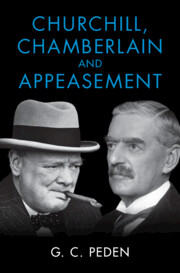Book contents
- Churchill, Chamberlain and Appeasement
- Churchill, Chamberlain and Appeasement
- Copyright page
- Contents
- Figures
- Tables
- Acknowledgements
- Abbreviations
- Introduction
- 1 Churchill, Chamberlain and Historians
- 2 Personalities and Policymaking
- 3 Britain and the Balance of Power
- 4 The Darkening Scene
- 5 The Ethiopian and Rhineland Crises
- 6 Chamberlain Takes Charge
- 7 From the Anschluss to Munich
- 8 From Munich to Prague
- 9 Deterrence by Guarantee
- 10 The Test of War
- 11 Counterfactuals and Conclusions
- Notes
- Bibliography
- Index
4 - The Darkening Scene
Published online by Cambridge University Press: 11 November 2022
- Churchill, Chamberlain and Appeasement
- Churchill, Chamberlain and Appeasement
- Copyright page
- Contents
- Figures
- Tables
- Acknowledgements
- Abbreviations
- Introduction
- 1 Churchill, Chamberlain and Historians
- 2 Personalities and Policymaking
- 3 Britain and the Balance of Power
- 4 The Darkening Scene
- 5 The Ethiopian and Rhineland Crises
- 6 Chamberlain Takes Charge
- 7 From the Anschluss to Munich
- 8 From Munich to Prague
- 9 Deterrence by Guarantee
- 10 The Test of War
- 11 Counterfactuals and Conclusions
- Notes
- Bibliography
- Index
Summary
Chamberlain’s first challenge on becoming chancellor in 1931 was how to deal with the Great Depression. The reasons why his policies on trade and war debts placed strains on Anglo-American relations, and the consequences for Britain’s ability to wage war in future, are explained, as are the reasons why Churchill agreed with his actions. The responses of the two men to the deterioration in international relations, beginning with the Manchurian crisis and the breakdown of the Geneva Disarmament Conference are compared. There then follows an analysis of how defence policy was transformed in 1934 by Chamberlain working within government for priority for the RAF and by Churchill pressing in the House of Commons for parity with Germany in the air. Priority for air defence implied delay in preparing the army to fight in Europe at the outbreak of war. Chamberlain was also successful in ensuring that Germany rather than Japan was recognised as the main threat, but he failed to persuade Cabinet colleagues that Britain should seek a non-aggression pact with Japan, the chief obstacle being the adverse effect such a pact might have on Anglo-American relations.
Keywords
- Type
- Chapter
- Information
- Churchill, Chamberlain and Appeasement , pp. 88 - 117Publisher: Cambridge University PressPrint publication year: 2022

